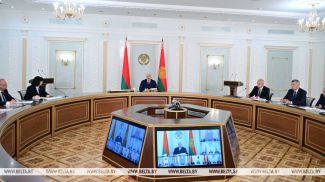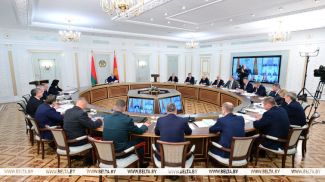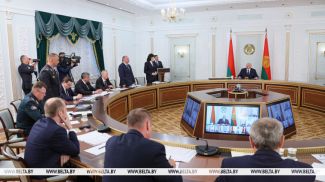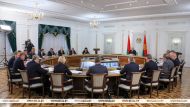MINSK, 28 September (BelTA) – Belarus President Aleksandr Lukashenko made a number of remarks about a broad range of topics during an expanded session of the Constitutional Commission on 28 September. In particular, he made a few remarks in response to proposals put forward by Grigory Vasilevich, Doctor of Law, Honored Lawyer of Belarus, BelTA has learned.
According to Grigory Vasilevich, if the need arises, the parliament should be involved in the process of the president's impeachment in addition to the Belarusian People's Congress, which is supposed to get a constitutional status. “Yes, the Belarusian People's Congress will make the final decision. But it might be a good idea to leave the parliament in charge of the preliminary procedure,” the lawyer said.
Aleksandr Lukashenko backed the idea. He also remarked upon the impeachment procedure the Constitution specifies. “If one wonders whether the president can be impeached in line with the current Constitution, the answer will definitely be no. Practically no,” he said.
The president explained that the current Constitution was put together when the society was in disarray and in need of strong authority. “What is a strong authority? A president able to act without fear that he will be swept away tomorrow was needed,” Aleksandr Lukashenko remarked.
He reminded that he faced attempts to remove him from the office in the early days of his presidential career.
“I even know many things from the inside. I know what was happening in the Constitutional Court,” Grigory Vasilevich said.
Aleksandr Lukashenko said that the current situation is different. He is convinced that the possibility of removing the president due to the president's inaptitude should be part of the Constitution. “It is part of all the constitutions. But how should it be implemented? What role does the parliament play? It is definitely necessary to leave the provision that the parliament, both chambers of the parliament should suggest it. Maybe the Constitutional Court has to pronounce the conclusion. And then the Belarusian People's Congress when people gather up and close the chapter. Is it real? It is. Without any quibbling. Everything understandable,” Aleksandr Lukashenko suggested.
Grigory Vasilevich also raised the matter of the parliament's approval of the prime minister the president appoints. “There is overreach from the point of view of granting powers to chambers of the parliament. When both chambers have to give their approval of the prime minister's candidacy to the president. If we talk about distant future, there may be a conflict between chambers with a different opinion,” Grigory Vasilevich said while talking about the draft of the updated Constitution.
Grigory Vasilevich remarked that the wording can be adjusted to authorize the lower chamber to give its approval of the prime minister while taking into account the opinion of the upper chamber.
On the whole, Grigory Vasilevich noted that the existing Constitution mentions that the president has to seek preliminary approval before appointing certain officials.
Aleksandr Lukashenko noted that although he does not want to offer opinions about some matters, nevertheless, he spoke up on some of the raised issues. The head of state believes that if the parliament has two chambers, it is normal that the approval of the two chambers is needed for the prime minister's appointment. “But most importantly we are making the government stronger. And we are making the prime minister stronger. We are vesting him with additional powers. The prime minister will have certain powers regarding the formation of the government. If we make the prime minister stronger, he needs the approval of the two chambers of the parliament,” Aleksandr Lukashenko said.
As for possible conflicts between the chambers of the parliament, Aleksandr Lukashenko remarked that it is part of their job. “They should always be at odds with each other in a good sense of the word,” he believes.
The fact that there have been no conflicts between them up till now is explained by thorough work on the bills, by the parliamentarians' involvement in the lawmaking process from the very start. Moreover, serious draft legislation is often discussed at government conferences right up to the presidential level. “Always in touch. We work together humanly,” he explained.
Aleksandr Lukashenko also remarked that while the House of Representatives of the National Assembly is primarily focused on lawmaking, the Council of the Republic of the National Assembly has some powers regarding the appointment of personnel: “Human resources mainly go through the Council of the Republic and the Central Election Commission, the Constitutional Court, the National Bank, and the rest.”
Aleksandr Lukashenko believes there is no need to shift the functions and immerse the House of Representatives of the National Assembly into work with human resources too much. For instance, if one assumes that the House of Representatives has to form the government. “The government is the executive branch. A different branch. We don't need a conflict here. We don't want the legislative branch to interfere with the operation of the executive branch,” the president stressed.
Yet the head of state did not rule out that it might be a good idea to preserve the existing arrangements when the prime minister is appointed by the president with the approval of the House of Representatives. “If we talk about human resources, the practice of appointing the prime minister with the parliament's approval – the House of Representatives in our country – has been established. Maybe we shouldn't deviate from that. Although it is a departure strictly speaking,” Aleksandr Lukashenko noted.
And then again Belarus has managed to avoid the mix-up of functions and powers of branches of power because the country's president is virtually above the branches of power, Aleksandr Lukashenko stated.
“We should think about it and keep in mind that we don't want the mix-up. Everyone should mind their own business. A stronger prime minister makes the executive branch stronger and makes it more independent. And then there is the president. He bears responsibility for it. He will have the relevant authority since it is a presidential republic. Without excessive interference with the legislative branch,” Aleksandr Lukashenko stated.
“Just some contemplations. We will see what we will come up with in the end,” he added.
Aleksandr Lukashenko also agreed with Grigory Vasilevich's statement that the Constitution should stipulate social guarantees for citizens instead of some preferences. “We need guarantees. It is a broader term. And all these guarantees should be implemented into laws,” the president noted.
In turn, Grigory Vasilevich backed Aleksandr Lukashenko's idea that it is necessary to work out transitional provisions on a number of matters and specify the sequence of actions with regard to the outlined problems. Including the possible introduction of the single ballot day for elections to the House of Representatives of the National Assembly and to municipal councils of deputies. It is necessary to specify what actions should be taken if, for instance, the authority of the House of Representatives of the National Assembly is prematurely terminated.
Grigory Vasilevich also spoke about how many people the Belarusian People's Congress should include. Limiting it to 1,500 people instead of the previous number of about 2,500 is an option. “A more optimal figure may be more attractive. We want people to understand it is not the expansion of some bureaucratic apparatus,” he said. “Options have been discussed. And we had a consensus that the Belarusian People's Congress should include members of the parliament, the existing president, and, I've suggested it, the retired president is a member of the Belarusian People's Congress by default. When we moved to the oblast level, the level of the Minsk City Council of Deputies, we had arguments indeed.”
Rather unexpectedly Grigory Vasilevich suggested considering whether Belarus needs a commissioner for human rights because the lawyer prepared a concept of the body several years ago. “The Constitutional Court is getting huge powers. I think it is right. Considering the substantial increase in authority of the Constitutional Court, do we need the commissioner for human rights? The commissioner will be just a government agency without real powers. I don't think we need it,” he said.
Ordinances of the president represent another hot topic. Some suggest they should be scrapped. At the beginning of the Constitutional Commission session Aleksandr Lukashenko drew attention to what would happen to the ordinances that had been passed already. It is not difficult to find a legal way out but Grigory Vasilevich suggested that the president should keep the power to issue ordinances. “But only when the parliament is not in session. Yes, the term has been substantially extended. In essence the parliament will work for about ten months according to the draft [Constitution]. In this period it may be a good idea for the president to keep the right to issue ordinances out of special necessity. But we can also think about preserving the validity of these ordinances, about the possibility of abolishing them and so on. These matters are purely legislative but tied to the Constitution,” the lawyer noted.
Grigory Vasilevich also identified the suggested correlation of laws and presidential decrees as a problem. “According to the draft Constitution presidential decrees have to comply with laws. It seems to me that laws and decrees have to comply with the Constitution considering the status of these bodies – the parliament and the president. If there are collisions between a law and a decree, the Constitutional Court will take care of it,” Grigory Vasilevich suggested. Otherwise, presidential decrees will have a lower status than the laws the parliament will pass.
“Removing the norm that allows voters to recall members of the parliament from the Constitution looks questionable. I think the possibility of being recalled is an incentive for MPs to work with citizens, voters, explain the policy. I don't think it is entirely correct to scrap the norm from the legal point of view and other ones,” the lawyer continued.
Grigory Vasilevich also suggested that the draft Constitution should put more focus on developing local self-government.
“The text is rather well-done but there are a lot of issues that need more polish,” Grigory Vasilevich said.













